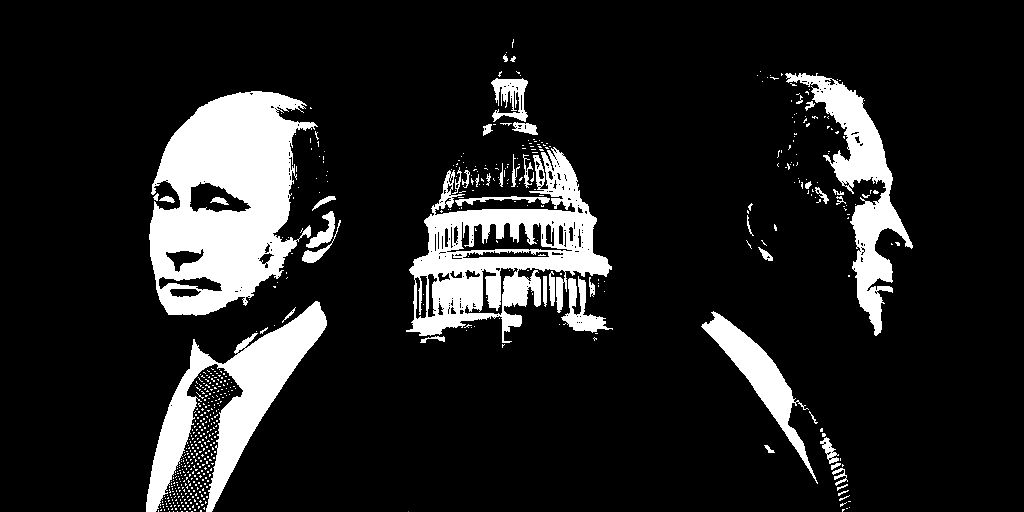Prospects For U.S.-Russia Relations During the Biden Presidency

U.S.-Russia Relations under Trump
From the Russian point of view, Donald Trump’s presidency did not live up to the hopes invested in it, as bilateral relations became the worst since the fall of the USSR. Despite Trump’s messaging, which emphasised his personal desire to improve relations with Russia, Congress showed a bipartisan willingness to take action against the Russian authorities for their interference in the 2016 U.S. presidential election. The sanctions regime introduced during President Barack Obama’s term was consolidated by Congress under the CAATSA law. It prevented Trump from easing or lifting restrictions without the consent of the Senate, which, like the House of Representatives, advocated for a firm policy towards Russia.
In the National Security Strategy published by the White House in 2017, Russia, alongside China, was recognised as one of the most important threats to the U.S. Following this, the administration tried, among others, to prevent the construction of the Nord Stream 2 (NS2) gas pipeline and criticised the Russian authorities for violating human rights. At the same time, the U.S. strengthened NATO’s Eastern Flank and supplied weapons to Ukraine. The Trump administration believed that Russia was violating arms control agreements and therefore withdrew from the INF Treaty and the Open Skies Treaty, at the same time insisting that these commitments should include China.
Due to opposition from Congress, Trump failed in his attempt to improve political relations with Russia, initiated by the Helsinki summit in 2018. Both sides later reduced the number of diplomats and consular offices and introduced restrictions on the activities of foreign media in their countries. In 2018, the U.S. authorities ordered the registration of Russian television outlet RT and the mixed-media Sputnik as foreign agents. In response, the Russian Duma adopted amendments to the law on media, designating those receiving foreign funding with a similar status as the U.S.
Biden’s Goals Involving Russia
The main aim of the new U.S. administration in regard to Russia will be to stem its confrontational policy in the international arena and limit Russian instruments of influence on the internal situation in the U.S. The scepticism of Russia is influenced, among others, by the experience of the failed “reset” during the Obama presidency, which then Vice-President Biden was against at the time. Due to Russia’s growing dependence on China, Biden cannot count on political support from Russia in the U.S.-China rivalry.
The new administration is considering the possibility of cooperating with Russia in specific areas. These include the negotiated extension of the New START treaty, which defines the conditions for limiting strategic nuclear forces. Regulating this issue will allow the U.S. to continue the dialogue with Russia on the presence of medium-range missiles deployed on its European territories. The issues of climate change and environmental protection may also become areas of cooperation, for example, in the Arctic, although they will not change the U.S. threat perception of Russia in the region. Additionally, the Biden administration places an emphasis on the development of renewable energy sources, which is not in the interests of Russia, whose economy is still dependent on oil and natural gas exports.
The Biden administration’s commitment to defend democratic values will be the basis for formulating a tougher stance on Russia for its occupation of Crimea and Donbas and the violation of human rights by the Russian authorities, including in the case of Alexei Navalny. Aid to Ukraine will be part of a strategy of containing Russia in its neighbourhood, including limiting the possible escalation of military operations in Donbas. Biden has pledged to help resolve the conflict and to try to modernise the Ukrainian armed forces. The new administration also wants to support Belarusian civil society politically and materially.
At the same time, the U.S. will continue efforts to suspend the NS2 construction. Dialogue with European partners supporting its construction will not change the U.S. negative position on the project due to the fact that easing of this position would expose Biden to a conflict with Congress, which also opposes the construction of the gas pipeline.
Russia’s Stance Towards the U.S.
The Russian authorities are ready to continue to compete with the U.S., signalling their readiness for conditional dialogue. Their goal will be to further weaken the American position in the world, and a return to U.S.-Russia talks will be presented as an appreciation of Russia’s superpower status.
Russia counts on the predictability of the Biden administration, its attitude towards multilateralism, and its need to focus attention on domestic issues (the COVID-19 pandemic, political polarisation, and economic problems). Putin expects the resumption of talks on international security among the permanent members of the UN Security Council, which is why he welcomed the news that Biden returned to negotiating an extension of New START. Russia also will try to persuade states to resume talks on Iran’s nuclear programme and the U.S. to re-join the JCPOA, from which Trump withdrew the country. However, Russia will not insist on a further lifting of restrictions on Iran because since October last year it has benefited from the non-renewal of the UN embargo on conventional weapons sales to Iran. Russia will now be less eager to open up to Iranian energy resources, which are competing with Russian products.
At the same time, Russia fears that Biden administration policies could have a negative impact on its interests. This may be influenced by the president’s associates, including Secretary of State Antony Blinken, who have knowledge of the Eastern Europe region, offer a critical assessment of the system of governance led by Vladimir Putin, and will likely push for increased U.S. support for Ukrainian territorial integrity. Russia will act against American involvement in its neighbourhood (specifically in Georgia, Ukraine, and Belarus), especially if the U.S. provides military aid to Ukraine. The implementation of Biden’s declaration about increasing America’s role in collective defence and further strengthening NATO’s Eastern Flank as an instrument of transatlantic cooperation will be perceived as a continuation of the alleged attempt to “encircle” Russia with Alliance forces. Russia will also try to counteract the tightening of sanctions against NS2, using Germany’s reluctance to extraterritorial U.S. sanctions.
Conclusions
Due to the political consensus in the U.S. regarding a tough stance towards Russia, no reset in bilateral relations should be expected. The Biden administration will be the first in 30 years not to try to improve relations with Russia. The U.S. is likely to investigate Russian interference in the 2020 presidential election and last year’s hacking of key systems, not ruling out a retaliatory operation similar to one in 2018.
It will be in the American interest to settle the issue of arms control with Russia, limit nuclear programmes around the world (especially Iran, North Korea) and talks to protect the climate, which, due to the conflicting interests of the U.S. and Russia, will not bring a breakthrough in mutual relations.
Russia will continue to compete and test American engagement in the world. The Russian authorities will aim to undermine U.S. allies’ credibility by, for example, attacking American NATO partners in cyberspace, which will pose a challenge to Poland’s security. On the other hand, the American efforts to strengthen NATO, transatlantic relations, and limit Russia's influence in Europe are in Poland’s interest. Additional U.S. sanctions focused on Putin’s circle of power, as well as restrictions related to NS2 also align with Polish interests. For Russia, Biden’s presidency means a return to the policy of promoting democratic values. Poland may benefit from American support for Ukraine and civil society in Belarus and Russia. It is worth considering including Poland in talks with the U.S. on energy security in Eastern Europe, including the use of the Polish experience in reducing energy dependence on Russia, development of wind technology, and decentralisation of state power.



